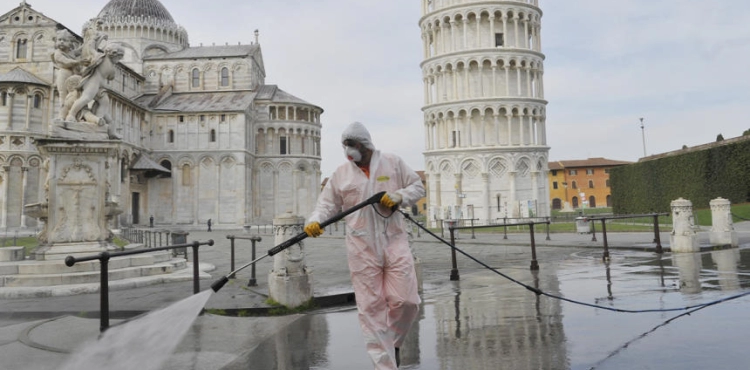After Italy appeared to have reached a kind of stability in the global epidemic crisis, as the outbreak of the virus appeared to be declining, the country is considering restoring life with a health plan proposed by the government, which expects it will not be return To normal life close.
Italy, the country most affected by the emerging coronavirus in the world in terms of deaths, recorded a decrease in the number of cases requiring intensive care in hospitals for the first time since the outbreak began more than a month ago.
Fear of lax adherence to isolation measures as the weather improves and Easter holidays, the authorities have not stopped repeating the same idea in recent days. The idea: "vigilance must continue" in the face of the virus.
In the middle of the week, Prime Minister Giuseppe Conte warned that "we are not in a position (to allow) the easing of measures" of isolation, declaring that life in Italy will remain suspended until at least April 13th.
"The state of emergency has not ended. The danger has not disappeared. We still have a few difficult months ahead, let us not spoil the sacrifices made," Health Minister Roberto Speranza said Sunday in an interview with the newspapers "El Corriere della Sera" and "La Republica".
The minister added that the goal is to return to normalcy "as soon as this is possible" without "giving a specific date".
On Friday, Civil Defense Director Angelo Borrelli, who announces the number of victims every evening, explained that the peninsula will remain isolated until May 1, before he indicates that the decision is exclusively up to the government.
Borelli also spoke cautiously of the 16th of May as a possible date for entry into the "stage number 2", which means "living with the virus" but only "if the evolution of the epidemic does not change".
On Sunday, the Minister of Health presented a five-point strategic plan for "gradual graduation" from the global epidemic crisis, which recommends generalized wearing of protective masks, "strict social separation in places of living and work", and the establishment of a hospital-specific anti-covid-19 hospital system that remains in place after the crisis to prevent a possible return of the virus.
The government intends to strengthen "local health networks" in order to be able to provide for every patient, from conducting a virus screening test to providing treatment and population screening to determine the exact number of infected people.
Finally, the government intends to introduce an application on smartphones similar to the South Korean model, with the aim of monitoring the movements of the injured during the 48 hours before their injury and stimulating telemedicine with the aim of for example monitoring the heart rate and the level of oxygen in the blood while the person is at home.
This week, the president of the Higher Institute of Health, Silvio Brosaviero, warned that "even if the number of new infections in the corona becomes zero, life will not be the same (as before) for a long time."
With the easing of isolation measures, the first activities to be resumed are those associated with the food and pharmaceutical supply chain. This should include craftsmen whose stores are intended for a very limited number of people.
Bars, restaurants, discotheques and sports clubs will open their doors at the end, and when this date comes, it is likely that the owners of these stores will have to maintain a safe distance of at least one meter between their customers and their employees as well.
As for people who want to return to Italy, who are currently about two hundred thousand Italians, according to official figures, they will have to isolate themselves and present a permit when boarding a plane or train, specifying the address where they will subject themselves to a period of stone.
Public transportation will keep its flights low. This will be possible to implement thanks to observers charged with making passengers stick to a distance between them by using one seat out of two or by not allowing only a certain number of people to be boarded in train and bus cars.












